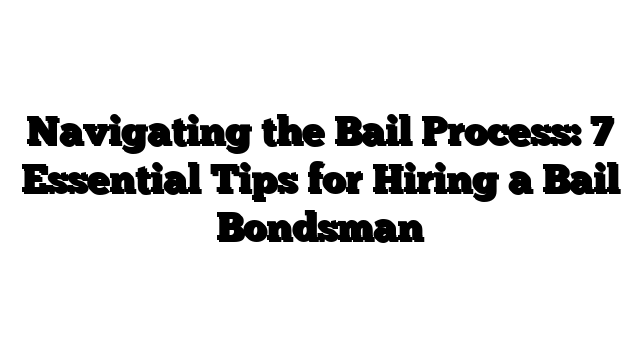The bail system can be a complex and daunting process for those unfamiliar with the legal system. Hiring a bail bondsman can be a crucial step in ensuring the release of a loved one from custody while awaiting trial. If you find yourself in need of a bail bondsman, it is essential to approach the situation armed with knowledge and discernment. Here are seven tips to guide you through the process of selecting a bail bondsman with confidence, including advice from experts such as BailCo Bail Bonds from Hartford, CT.
Understanding the Bail Bondsman’s Role
A bail bondsman, or bail agent, is a professional who provides a surety bond to the court, which allows for the release of a defendant awaiting trial. This service typically requires a fee from the defendant or their family, usually a percentage of the total bail amount set by the court. The bondsman then assumes responsibility for ensuring the defendant’s appearance at all scheduled court dates. Grasping the bail bondsman’s role is the first step in making an informed decision when choosing one.
Verifying Licensure and Good Standing
Ensure that the bail bondsman you are considering is licensed to operate in your state. A licensed bondsman is not only legally authorized to provide bail bond services but also adheres to state regulations governing the bail industry. Verifying licensure can often be done through online databases provided by state insurance departments. A bond agent in good standing should have no issue providing proof of licensure and a clean record of practice.
Assessing Reputation and Experience
Reputation and experience in the bail bond industry can be indicative of reliability and quality of service. Look for bondsmen who have established a positive reputation in the community and have ample experience handling cases similar to yours. Reading reviews, asking for references, and checking with the Better Business Bureau can provide insights into the bondsman’s track record. An experienced bail bondsman will navigate the bail process with proficiency, reducing stress and uncertainty.
Evaluating Responsiveness and Availability
Time is of the essence in the bail process, and a responsive bail bondsman can make a significant difference. Evaluate potential bondsmen on their willingness to act swiftly and their availability to assist you outside of regular business hours, just like how workers’ compensation helps individuals with an accident claim. A reliable bondsman should be readily accessible to address your concerns and update you on the progress of your case at any time.
Understanding Fees and Payment Options
Before entering into an agreement with a bail bondsman, it is crucial to understand the fees involved and the available payment options. The standard fee is usually a percentage of the total bail amount, and it is non-refundable. Some bondsmen may offer payment plans or accept collateral in lieu of full upfront payment. Ensure that all fees and payment terms are discussed transparently to avoid any unexpected financial burdens.
Reading the Fine Print
When hiring a bail bondsman, you will likely need to sign a contract outlining the terms of service. It is imperative to read and understand the fine print of any agreement before signing. Pay close attention to any obligations you are agreeing to, such as providing collateral or being responsible for the full bail amount if the defendant fails to appear in court. If there is anything you do not understand, do not hesitate to ask for clarification.
Building a Trusting Relationship
The relationship between you and your bail bondsman is predicated on trust. You are entrusting them with the freedom of your loved one, and they are trusting you to uphold your end of the agreement. Communication is key to building this trust. A reputable bail bondsman will communicate clearly, treat you with respect, and provide guidance throughout the bail process.
Hiring a bail bondsman is a decision that should not be taken lightly. By understanding the role of a bail bondsman, verifying licensure, assessing reputation and experience, evaluating responsiveness, understanding fees, reading the fine print, and building a trusting relationship, you can navigate the bail process with greater ease and confidence. These seven tips serve as a comprehensive guide to making an informed choice when selecting a bail bondsman, ensuring that you receive the professional support you need during this challenging time.
James Martin is a passionate writer and the founder of OnTimeMagazines & EastLifePro. He loves to write principally about technology trends. He loves to share his opinion on what’s happening in tech around the world.



